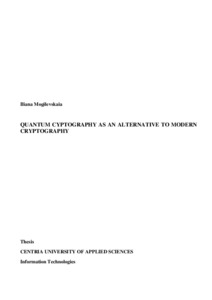Quantum computing in finance: a pioneering technology or risk multiplier
Reinikka, Jesse (2025)
Reinikka, Jesse
2025
All rights reserved. This publication is copyrighted. You may download, display and print it for Your own personal use. Commercial use is prohibited.
Julkaisun pysyvä osoite on
https://urn.fi/URN:NBN:fi:amk-2025051612689
https://urn.fi/URN:NBN:fi:amk-2025051612689
Tiivistelmä
This thesis was motivated by the rapid evolution of quantum computing and its potential impact on financial markets. Its primary objective was to assess if quantum computing in finance would appear as a pioneering force driving innovation or function as a risk multiplier that exacerbates financial instability. Chapters 2 and 3 provide a technical foundation, detailing the distinctive features of quantum versus classical computing, current hardware developments, and key applications including optimization, stochastic modeling, machine learning, and security.
A mixed‐methods approach was employed, centered on a mixed studies review of ten publicly accessible, English language papers published within the last six years. Five keyword queries were run across Google Scholar, ScienceDirect, SpringerLink, and Web of Science. Records were filtered for open access, language, and direct relevance, then screened by title and abstract to yield fifteen candidates. A final full‐text review reduced this to ten papers. Analysis identified core benefits such as near real time risk assessment, enhanced optimization of NP hard problems, and significant gains in predictive accuracy and critical challenges, including limited qubit counts, quantum noise, cybersecurity vulnerabilities, and regulatory gaps.
The findings suggest that quantum computing holds transformative promise in finance through dramatic speedups and novel algorithms, yet considerable obstacles remain to practical implementation. Early adoption is deemed too risky given current hardware and regulatory constraints. However, as investments grow and the technology matures, many challenges are expected to diminish. Future research should focus on empirical validation with emerging quantum hardware, development of robust error‐mitigation techniques, and creation of standardized regulatory frameworks to guide the safe integration of quantum technologies into financial practice.
A mixed‐methods approach was employed, centered on a mixed studies review of ten publicly accessible, English language papers published within the last six years. Five keyword queries were run across Google Scholar, ScienceDirect, SpringerLink, and Web of Science. Records were filtered for open access, language, and direct relevance, then screened by title and abstract to yield fifteen candidates. A final full‐text review reduced this to ten papers. Analysis identified core benefits such as near real time risk assessment, enhanced optimization of NP hard problems, and significant gains in predictive accuracy and critical challenges, including limited qubit counts, quantum noise, cybersecurity vulnerabilities, and regulatory gaps.
The findings suggest that quantum computing holds transformative promise in finance through dramatic speedups and novel algorithms, yet considerable obstacles remain to practical implementation. Early adoption is deemed too risky given current hardware and regulatory constraints. However, as investments grow and the technology matures, many challenges are expected to diminish. Future research should focus on empirical validation with emerging quantum hardware, development of robust error‐mitigation techniques, and creation of standardized regulatory frameworks to guide the safe integration of quantum technologies into financial practice.
Kokoelmat
Samankaltainen aineisto
Näytetään aineisto, joilla on samankaltaisia nimekkeitä, tekijöitä tai asiasanoja.
-
Quantum cryptography as an alternative to modern cryptography
Mogilevskaia, Iliana (2019)Several big companies already developed working prototypes of quantum computers, however they are not powerful enough to perform complicated calculations and are very massive, just like the first models of conventional ... -
Study on the preparation of netted InP/ZnS quantum dot aggregates and their photocatalytic hydrogen production
Ying, Dai (2022)A promising technology, photocatalytic hydrogen production allows the direct conversion of solar energy into chemically clean fuels. The property of quantum dots as photocatalysts is crucial to photocatalytic hydrogen ... -
Post Quantum Cryptography: impact to the public key cryptography
Luukkanen, Juha (2022)Julkisen avaimen salauksella on merkittävä rooli ihmisten jokapäiväisessä elämässä, yritysten liiketoiminnassa sekä yhteiskunnan kriittisissä toiminnoissa. Kvanttitietokoneella tarkoitetaan tietokonetta joka, käyttää ...



